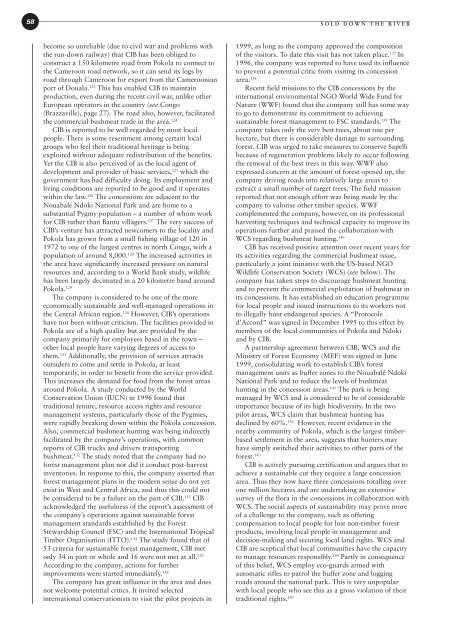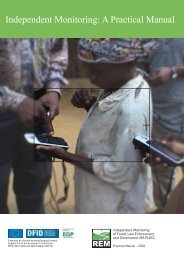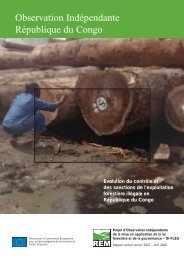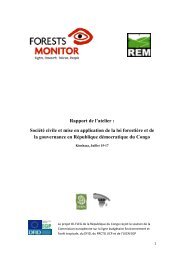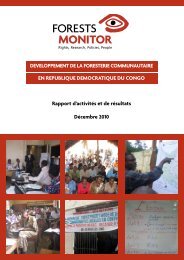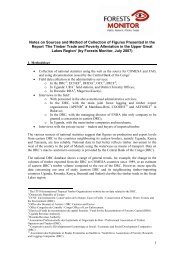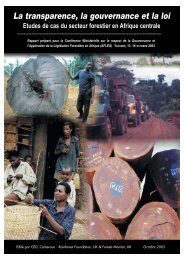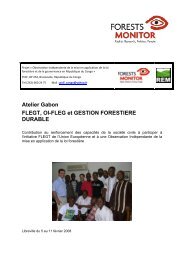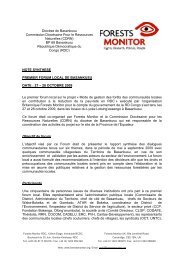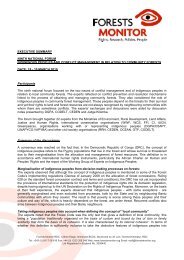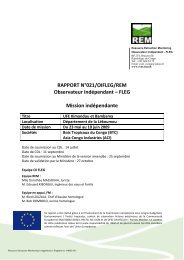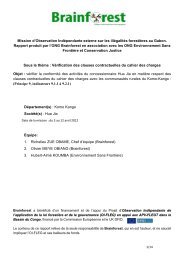Sold down the river - Salva le Foreste
Sold down the river - Salva le Foreste
Sold down the river - Salva le Foreste
You also want an ePaper? Increase the reach of your titles
YUMPU automatically turns print PDFs into web optimized ePapers that Google loves.
58SOLD DOWN THE RIVERbecome so unreliab<strong>le</strong> (due to civil war and prob<strong>le</strong>ms with<strong>the</strong> run-<strong>down</strong> railway) that CIB has been obliged toconstruct a 150 kilometre road from Pokola to connect to<strong>the</strong> Cameroon road network, so it can send its logs byroad through Cameroon for export from <strong>the</strong> Cameroonianport of Douala. 123 This has enab<strong>le</strong>d CIB to maintainproduction, even during <strong>the</strong> recent civil war, unlike o<strong>the</strong>rEuropean operators in <strong>the</strong> country (see Congo(Brazzavil<strong>le</strong>), page 27). The road also, however, facilitated<strong>the</strong> commercial bushmeat trade in <strong>the</strong> area. 124CIB is reported to be well regarded by most localpeop<strong>le</strong>. There is some resentment among certain localgroups who feel <strong>the</strong>ir traditional heritage is beingexploited without adequate redistribution of <strong>the</strong> benefits.Yet <strong>the</strong> CIB is also perceived of as <strong>the</strong> local agent ofdevelopment and provider of basic services, 125 which <strong>the</strong>government has had difficulty doing. Its employment andliving conditions are reported to be good and it operateswithin <strong>the</strong> law. 126 The concessions are adjacent to <strong>the</strong>Nouabalé Ndoki National Park and are home to asubstantial Pygmy population – a number of whom workfor CIB ra<strong>the</strong>r than Bantu villagers. 127 The very success ofCIB’s venture has attracted newcomers to <strong>the</strong> locality andPokola has grown from a small fishing village of 120 in1972 to one of <strong>the</strong> largest centres in north Congo, with apopulation of around 8,000. 128 The increased activities in<strong>the</strong> area have significantly increased pressure on naturalresources and, according to a World Bank study, wildlifehas been largely decimated in a 20 kilometre band aroundPokola. 129The company is considered to be one of <strong>the</strong> moreeconomically sustainab<strong>le</strong> and well-managed operations in<strong>the</strong> Central African region. 130 However, CIB’s operationshave not been without criticism. The facilities provided inPokola are of a high quality but are provided by <strong>the</strong>company primarily for employees based in <strong>the</strong> town –o<strong>the</strong>r local peop<strong>le</strong> have varying degrees of access to<strong>the</strong>m. 131 Additionally, <strong>the</strong> provision of services attractsoutsiders to come and sett<strong>le</strong> in Pokola, at <strong>le</strong>asttemporarily, in order to benefit from <strong>the</strong> service provided.This increases <strong>the</strong> demand for food from <strong>the</strong> forest areasaround Pokola. A study conducted by <strong>the</strong> WorldConservation Union (IUCN) in 1996 found thattraditional tenure, resource access rights and resourcemanagement systems, particularly those of <strong>the</strong> Pygmies,were rapidly breaking <strong>down</strong> within <strong>the</strong> Pokola concession.Also, commercial bushmeat hunting was being indirectlyfacilitated by <strong>the</strong> company’s operations, with commonreports of CIB trucks and d<strong>river</strong>s transportingbushmeat. 132 The study noted that <strong>the</strong> company had noforest management plan nor did it conduct post-harvestinventories. In response to this, <strong>the</strong> company asserted thatforest management plans in <strong>the</strong> modern sense do not yetexist in West and Central Africa, and thus this could notbe considered to be a failure on <strong>the</strong> part of CIB. 133 CIBacknow<strong>le</strong>dged <strong>the</strong> usefulness of <strong>the</strong> report’s assessment of<strong>the</strong> company’s operations against sustainab<strong>le</strong> forestmanagement standards established by <strong>the</strong> ForestStewardship Council (FSC) and <strong>the</strong> International TropicalTimber Organisation (ITTO). 134 The study found that of53 criteria for sustainab<strong>le</strong> forest management, CIB metonly 34 in part or who<strong>le</strong> and 16 were not met at all. 135According to <strong>the</strong> company, actions for fur<strong>the</strong>rimprovements were started immediately. 136The company has great influence in <strong>the</strong> area and doesnot welcome potential critics. It invited se<strong>le</strong>ctedinternational conservationists to visit <strong>the</strong> pilot projects in1999, as long as <strong>the</strong> company approved <strong>the</strong> compositionof <strong>the</strong> visitors. To date this visit has not taken place. 137 In1996, <strong>the</strong> company was reported to have used its influenceto prevent a potential critic from visiting its concessionarea. 138Recent field missions to <strong>the</strong> CIB concessions by <strong>the</strong>international environmental NGO World Wide Fund forNature (WWF) found that <strong>the</strong> company still has some wayto go to demonstrate its commitment to achievingsustainab<strong>le</strong> forest management to FSC standards. 139 Thecompany takes only <strong>the</strong> very best trees, about one perhectare, but <strong>the</strong>re is considerab<strong>le</strong> damage to surroundingforest. CIB was urged to take measures to conserve Sapellibecause of regeneration prob<strong>le</strong>ms likely to occur following<strong>the</strong> removal of <strong>the</strong> best trees in this way. WWF alsoexpressed concern at <strong>the</strong> amount of forest opened up, <strong>the</strong>company driving roads into relatively large areas toextract a small number of target trees. The field missionreported that not enough effort was being made by <strong>the</strong>company to valorise o<strong>the</strong>r timber species. WWFcomp<strong>le</strong>mented <strong>the</strong> company, however, on its professionalharvesting techniques and technical capacity to improve itsoperations fur<strong>the</strong>r and praised <strong>the</strong> collaboration withWCS regarding bushmeat hunting. 140CIB has received positive attention over recent years forits activities regarding <strong>the</strong> commercial bushmeat issue,particularly a joint initiative with <strong>the</strong> US-based NGOWildlife Conservation Society (WCS) (see below). Thecompany has taken steps to discourage bushmeat huntingand to prevent <strong>the</strong> commercial exploitation of bushmeat inits concessions. It has established an education programmefor local peop<strong>le</strong> and issued instructions to its workers notto il<strong>le</strong>gally hunt endangered species. A “Protoco<strong>le</strong>d’Accord” was signed in December 1995 to this effect bymembers of <strong>the</strong> local communities of Pokola and Ndokiand by CIB.A partnership agreement between CIB, WCS and <strong>the</strong>Ministry of Forest Economy (MEF) was signed in June1999, consolidating work to establish CIB’s forestmanagement units as buffer zones to <strong>the</strong> Nouabalé NdokiNational Park and to reduce <strong>the</strong> <strong>le</strong>vels of bushmeathunting in <strong>the</strong> concession areas. 141 The park is beingmanaged by WCS and is considered to be of considerab<strong>le</strong>importance because of its high biodiversity. In <strong>the</strong> twopilot areas, WCS claim that bushmeat hunting hasdeclined by 60%. 142 However, recent evidence in <strong>the</strong>nearby community of Pokola, which is <strong>the</strong> largest timberbasedsett<strong>le</strong>ment in <strong>the</strong> area, suggests that hunters mayhave simply switched <strong>the</strong>ir activities to o<strong>the</strong>r parts of <strong>the</strong>forest. 143CIB is actively pursuing certification and argues that toachieve a sustainab<strong>le</strong> cut <strong>the</strong>y require a large concessionarea. Thus <strong>the</strong>y now have three concessions totalling overone million hectares and are undertaking an extensivesurvey of <strong>the</strong> flora in <strong>the</strong> concessions in collaboration withWCS. The social aspects of sustainability may prove moreof a chal<strong>le</strong>nge to <strong>the</strong> company, such as offeringcompensation to local peop<strong>le</strong> for lost non-timber forestproducts, involving local peop<strong>le</strong> in management anddecision-making and securing local land rights. WCS andCIB are sceptical that local communities have <strong>the</strong> capacityto manage resources responsibly. 144 Partly in consequenceof this belief, WCS employ eco-guards armed withautomatic rif<strong>le</strong>s to patrol <strong>the</strong> buffer zone and loggingroads around <strong>the</strong> national park. This is very unpopularwith local peop<strong>le</strong> who see this as a gross violation of <strong>the</strong>irtraditional rights. 145


